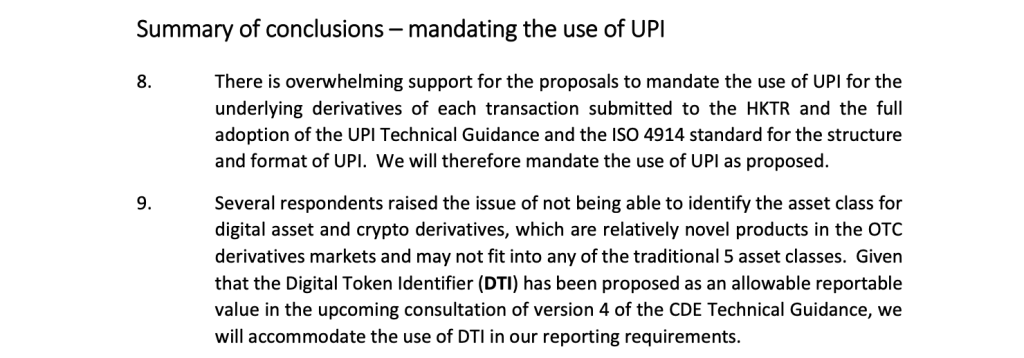Last updated:
 Why Trust Cryptonews
Why Trust Cryptonews

Hong Kong’s financial regulators are now set to adopt global reporting standards for over-the-counter (OTC) crypto derivatives, similar to the European Union’s framework.
On September 26, 2024, the Hong Kong Monetary Authority (HKMA) and the Securities and Futures Commission (SFC) announced their plan to update the region’s OTC derivatives reporting regime.
The new reporting requirements will incorporate Digital Token Identifiers (DTIs) and other key global identifiers, which align with the European Securities and Markets Authority (ESMA) standards.
The updates are expected to take effect by September 29, 2025.
The Consultation and Response Process: What is Next For Crypto in Hong Kong?
The decision to reform Hong Kong’s reporting standards for OTC crypto derivatives follows a March 2024 consultation led by the HKMA and the SFC.
The consultation paper received input from financial institutions, industry bodies, and stakeholders who emphasized the importance of integrating international standards to ensure seamless cross-border transactions and compliance.
Notably, one major issue raised by Hong Kong stakeholders was the classification of crypto OTC derivatives, which cannot be easily categorized under the existing five traditional asset classes — interest rates, foreign exchange, credit, commodities, and equities.
Stakeholders called for the adoption of Digital Token Identifiers (DTIs), which ESMA had already integrated into European reporting standards in October 2023.
The HKMA and SFC responded by confirming their intent to adopt DTIs for crypto-asset underliers in the OTC derivatives market.
The agencies acknowledged that the Unique Product Identifier (UPI), already mandated in other jurisdictions, will also play a crucial role in Hong Kong’s updated reporting regime.
In their joint statement, the HKMA and SFC highlighted the importance of aligning with global standards, noting that the ESMA’s adoption of the DTI provided a framework that could guide Hong Kong’s own regulatory updates.
Through this, Hong Kong aims to ensure transparency and consistency in classifying and identifying digital assets traded in its markets.

Hong Kong To Align With Global Standards
The HKMA and SFC have committed to mandating the reporting of Unique Transaction Identifiers (UTIs), UPIs, and Critical Data Elements (CDEs) to facilitate the international standardization and harmonization of data elements across OTC derivatives markets.
The authorities’ decision to implement these changes reflects the growing international pressure to improve transparency and compliance in the crypto derivatives space, particularly as more countries seek to regulate digital assets within their borders.
This updated regulatory framework is expected to promote better data aggregation and reporting practices for OTC crypto derivatives, which aligns Hong Kong with the G20’s commitment to reforming the global OTC derivatives market.
The new reporting regime will also enhance regulators’ ability to monitor financial markets, detect fraud, and mitigate systemic risks more effectively.
Notably, Hong Kong’s financial regulators also emphasized that DTIs and UPIs are critical for identifying specific transactions and products.
The standardization of these identifiers will also allow authorities to gather accurate data on OTC derivatives trades and ensure that both local and international markets remain compliant with global standards.
This timeline gives financial institutions ample time to adjust to the new requirements and integrate the necessary technological infrastructure to meet the updated reporting obligations.
This regulatory overhaul coincides with Hong Kong’s ongoing work on central bank digital currencies (CBDCs).
In September 2024, the HKMA launched the second phase of its digital Hong Kong dollar (e-HKD) pilot, known as Project e-HKD+, through the recent Visa fiat-backed token system. This project focuses on settlement for tokenized assets, programmability, and offline payments.














